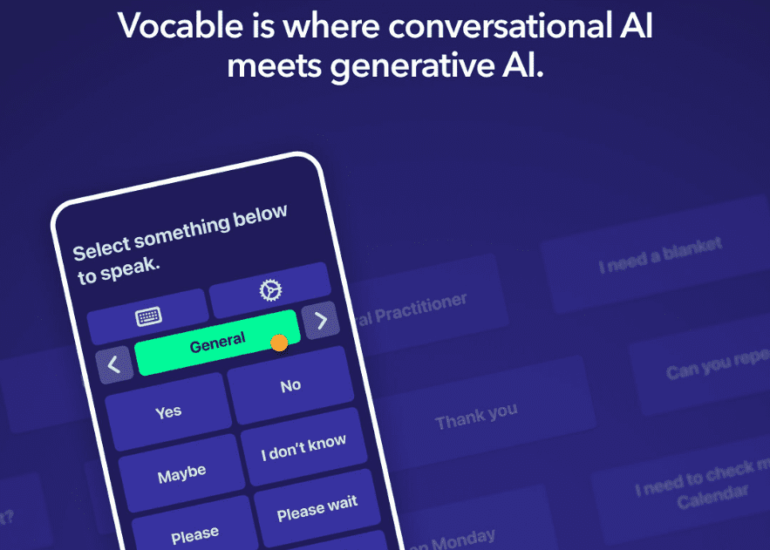TL;DR:
- WillowTree enhances Vocable AAC app with OpenAI’s ChatGPT integration.
- The app caters to non-verbal individuals and those with speech difficulties.
- Smart Assist feature listens to caregivers and offers AI-generated response options.
- Users can effortlessly select responses and engage in more natural conversations.
- Positive feedback from users highlights the app’s life-changing impact.
- A forthcoming book by WillowTree’s President explores the future of voice technology.
Main AI News:
In a groundbreaking move, WillowTree, a renowned digital experience consultancy, has unveiled an upgraded iteration of Vocable AAC, integrating the cutting-edge technology of OpenAI’s ChatGPT. This move is set to empower millions of individuals, including the 17.9 million U.S. adults who have faced challenges in speaking over the past year. Originally conceived as an augmented and alternative communication (AAC) tool for non-verbal individuals, the Vocable AAC mobile app now boasts the remarkable capabilities of conversational AI, promising a more intuitive and impactful means of communication.
The journey of Vocable AAC began in 2020 when former WillowTree designer Matt Kubota’s partner, Ana, was diagnosed with Guillain-Barré Syndrome, a rare autoimmune disorder that left her temporarily paralyzed and unable to communicate verbally. Ana’s sole mode of communication during her recovery was through painstakingly blinking at individual letters on a posterboard. The alternative, expensive, and cumbersome AAC devices on the market offered little solace, often costing upwards of $10,000 and demanding extensive customization.
Motivated by the need for a better solution, WillowTree’s dedicated team embarked on the development of Vocable AAC. The result was a breakthrough in accessible communication – users could now control a cursor on a smartphone or tablet with subtle head movements to type letters or select custom phrases from personalized categories. This innovation brought newfound communication possibilities to individuals affected by conditions such as MS, ALS, stroke, autism, spinal cord injuries, and even intubated hospital patients. Despite winning a prestigious Webby Award for “Experimental & Innovation Apps” in 2021, WillowTree’s commitment to improvement remained unwavering.
Fast forward to today, and the Vocable AAC app has taken a quantum leap forward with the introduction of the Smart Assist feature. This remarkable addition listens to caregivers and provides users with likely response options based on generative AI natural language models. The integration of OpenAI’s ChatGPT allows the app to maintain conversational context, enhance predictive pattern detection, and bolster semantic understanding of a caregiver’s speech. In simpler terms, Vocable AAC now acts as a seamless translator between caregivers and non-verbal individuals, enabling more natural communication through AI-generated responses.
To truly grasp the power of this transformation, envision a caregiver asking a non-verbal user, “What would you like for dinner?“
- Without Vocable, a paralyzed user must painstakingly blink as a caretaker points to individual letters on an alphabet board, spelling out their dinner request in a laborious process. An ambulatory, non-verbal user might resort to tapping pre-populated images of food on a bulky AAC device, provided they can afford one.
- With AI-enabled Vocable AAC, a tablet screen instantaneously presents a list of the user’s favorite restaurants. Upon selecting one with subtle head movements, Vocable populates the menu for that restaurant, enabling the user to place specific orders. If the caregiver poses a follow-up question, Vocable seamlessly generates responses, fostering a more natural, organic, and immediate conversation for both parties involved.
Andrew Carter, Staff Software Engineer at WillowTree, underscores the transformative nature of Vocable AAC’s integration: “ChatGPT is designed for conversations; it comprehends the entire conversation history, yielding superior AI-generated responses that empower non-verbal users.”
User feedback has emphasized the life-changing potential of this free app:
- Tom Meadows, founder of Steve’s Way, states, “Vocable is making a major difference in the ALS community. I have witnessed people shedding tears of joy while using your app.”
- Dr. John M. Costello, MA at Boston Children’s Hospital, adds, “In a landscape where few hospitals offer accessible communication technology, the existence of a platform like Vocable is truly exciting. It’s easy to access and, most importantly, it’s free.”
This significant update from WillowTree offers just a glimpse into the future of voice technology. Mark your calendars for October 2023 when Hachette will release WillowTree’s President Tobias Dengel’s book, “The Sound of the Future: The Coming Age of Voice Technology.” In this upcoming publication, Dengel elucidates how voice technology is poised to revolutionize both life and business, akin to the internet’s transformation in the ’90s and the advent of mobile computing a decade later.
Through Vocable AAC, WillowTree continues to lend a voice to millions, reminding us all of the profound connections that make us human.
Conclusion:
WillowTree’s integration of ChatGPT into the Vocable AAC app marks a significant advancement in accessible communication. This innovation has the potential to revolutionize the market by providing a more natural and immediate means of communication for individuals with speech difficulties, offering a practical solution that can make a substantial difference in their lives.

